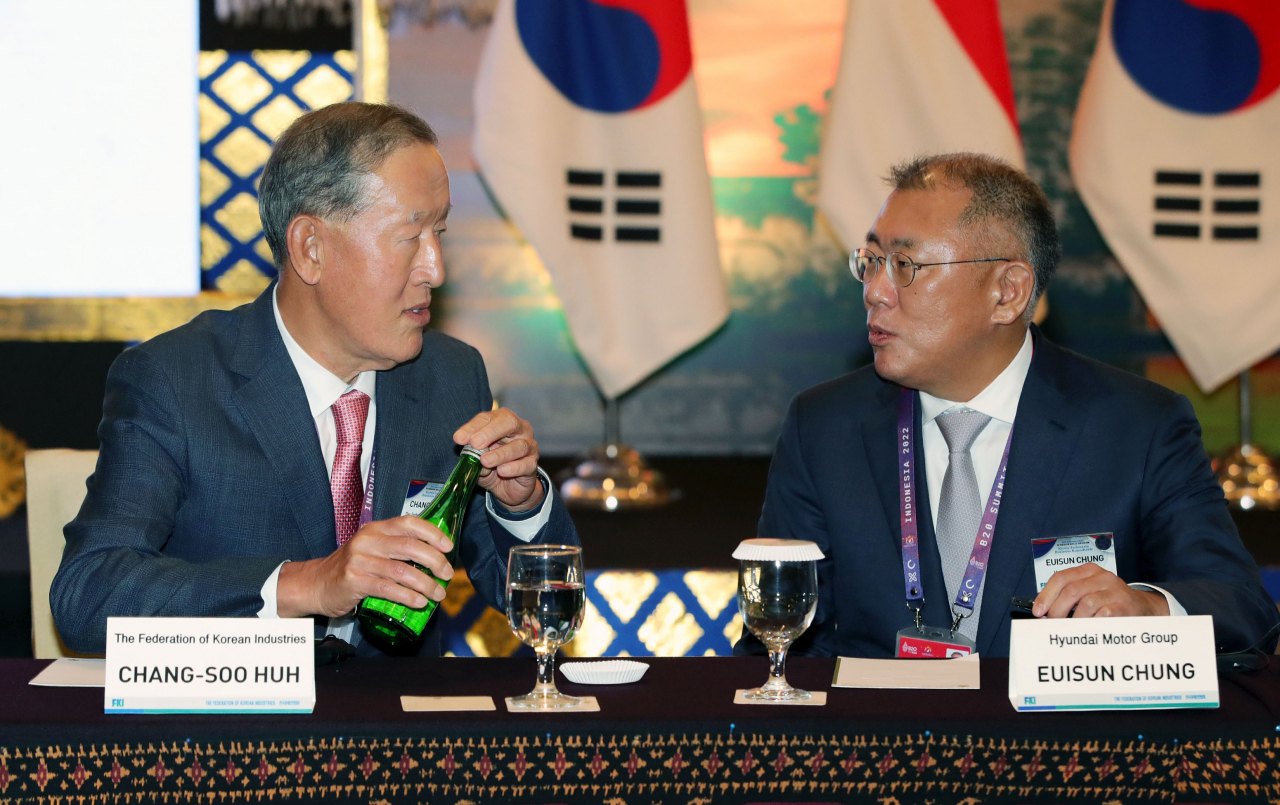 |
Huh Chang-soo (left), chairman of Federation of Korean Industries, and Hyundai Motor Group Executive Chair Chung Euisun talk during a Korea-Indonesia business roundtable event held on the sidelines of the G-20 summit in Bali, Indonesia, Monday. (Yonhap) |
Corporate Korea is betting big on Indonesia’s $34 billion capital relocation plan as they are expected to play a leading role in building futuristic infrastructure for smart city and flying cars.
During this week’s Group of 20 summit held on the resort island of Bali, South Korea and Indonesia on Monday signed a total of 10 memoranda of understanding to boost economic partnership between the two countries, whose official ties will reach the 50th anniversary next year.
The 10 agreements, consisting of six government- and four private-led projects, cover a range of topics across sectors, including digital transformation, carbon-free energy transition and resources and infrastructure development.
Korean businesses pinned especially high hopes on Indonesian leader Joko Widodo’s pet project -- relocating the country’s capital city from Jakarta to Nusantara, a new forest city on the island of Borneo. An estimated $34 billion will be poured into the massive high-tech development project that is expected to take almost a decade to complete.
Jokowi, as the president is popularly known, hopes to use the country’s G-20 presidency as an occasion to attract funding and support from the world’s richest countries and Korea, a tech power house, seems willing to join the initiative.
And two frontrunners are LG Group and Hyundai Motor Group.
Of the four private-led agreements, three were signed by LG CNS, an IT solutions unit of LG Group, the nation’s fourth-largest conglomerate.
LG CNS recently clinched a deal with the Nusantara National Capital Authority, a ministerial-level authority that oversees the relocation project, to design the smart city concept of the new capital. On Monday, the deal was made public for the first time during a business roundtable event on the sidelines of the B-20 summit of businesses and entrepreneurs.
Under the deal, the company will offer smart solutions to the city’s planning based on its artificial intelligence, data, cloud and digital-twin technologies.
Other LG companies, including LG Electronics, LG Energy Solution and LG Uplus, are also expected to add forces to seek synergy.
Adding to the smart city project, the company also signed deals with PT Pembangunan Perumahan, a state-run construction and investment firm, and PT Hotel Indonesia Natour, a state-run airport operator. The three entities plan to carry out a smart city project in Sanur, a coastal town in Bali.
“We will export our advanced digital transformation and smart city businesses through massive overseas development projects. Ultimately, we aim to become a global leader in smart city solutions,” said LG CNS CEO Kim Youg-shub.
On Monday, Hyundai Motor Group, the world’s third-largest carmaker, unveiled a new ambitious plan to build an ecosystem for advance air mobility (AAM), including flying cars and related infrastructure, in the new Indonesian capital.
In an MOU with the local authorities, the two sides agreed to work on issues such as establishing the concept of land-air mobility integration, testing advanced air mobility vehicles, and building related infrastructure and ecosystem.
“The introduction of AAM to the new Indonesian capital means it is a ‘living laboratory,’ in line with the authority of new Indonesian capital’s philosophy to create new culture of learning, working and lifestyle,” said Bambang Susantono, head of the Nusantara National Capital Authority.
“It is meaningful that we build the new capital as a sustainable smart city in collaboration with Hyundai Motor Group.”
Hyundai also expressed high expectations for the new project, which aims to provide an efficient model for the AMM ecosystem and ultimately enhance quality of life for residents of the island.
The carmaker added that, based on the achievements made in Indonesia, it would aim to create a broader AAM ecosystem around the world.
“We see the latest MOU with the Indonesian government as the first step to realizing Hyundai Motor Group’s vision and promise for a safe and innovative AAM system,” said Shin Jae-won, Hyundai Motor Group president in charge of AAM.
Earlier this year, Hyundai unveiled a vision for AAM that introduced its concept of urban air mobility and regional air mobility and set out a development road map for eco-friendly aircraft.
By 2028, it aims to begin the commercial service of UAM vehicles in the US via its aviation affiliate Supernal.




![[Exclusive] Hyundai Mobis eyes closer ties with BYD](http://res.heraldm.com/phpwas/restmb_idxmake.php?idx=644&simg=/content/image/2024/11/25/20241125050044_0.jpg)
![[Herald Review] 'Gangnam B-Side' combines social realism with masterful suspense, performance](http://res.heraldm.com/phpwas/restmb_idxmake.php?idx=644&simg=/content/image/2024/11/25/20241125050072_0.jpg)

